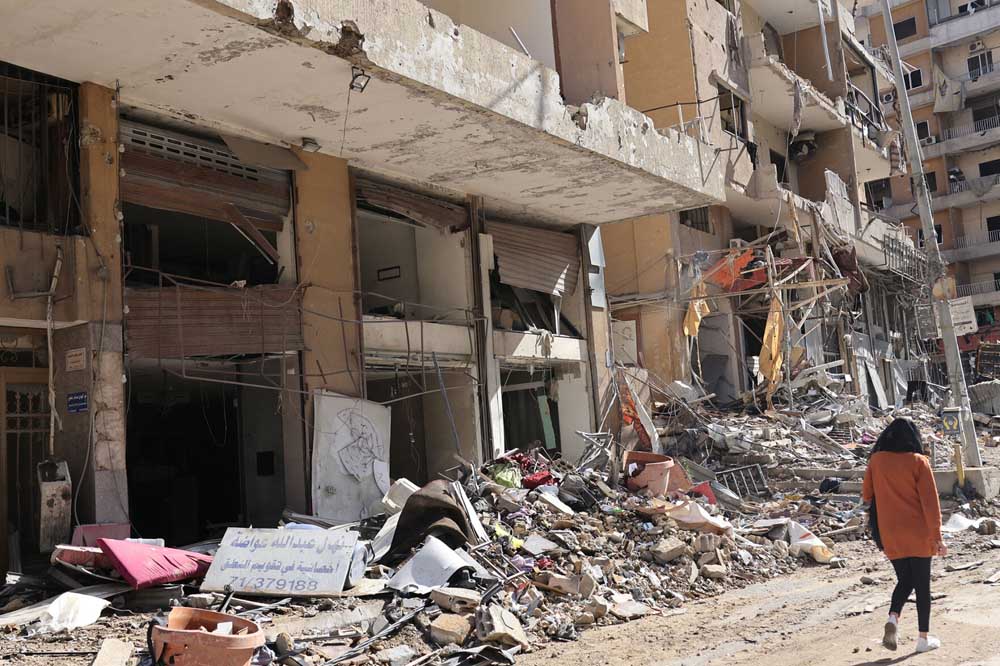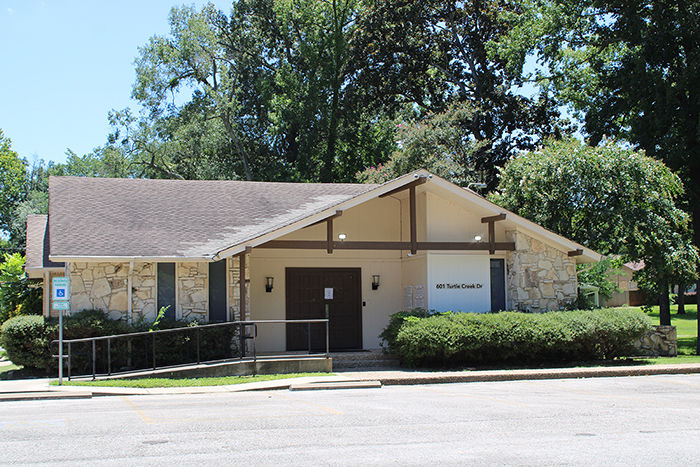Ceasefire between Israel and Hezbollah to begin Wednesday
Published 3:50 pm Tuesday, November 26, 2024

- A woman walks past buildings Monday damaged by Israeli strikes in southern Beirut’s Ruweiss district as the war continues between Israel and the Lebanese militant Hezbollah group. (Anwar Amro/AFP/Getty Images/TNS Photo)
BEIRUT/TEL AVIV — The Israeli security cabinet approved a ceasefire deal with Lebanon’s Hezbollah group to end more than a year of fighting, Prime Minister Benjamin Netanyahu’s office said.
The deal is to come into force on Wednesday at 4 a.m., after which fighting would stop for 60 days.
Trending
Israeli jets continued to pound parts of Lebanon late Tuesday, including launching more strikes on residential areas of Beirut.
Speaking from the White House, U.S. President Joe Biden hailed the “courageous” agreement, calling it a “new start” for Lebanon. He said the deal brokered by the U.S. and France, if fully implemented, is “designed to be a permanent cessation of hostilities.”
Caretaker Lebanese Prime Minister Najib Mikati called the agreement “an essential step toward spreading calm and stability in Lebanon, and the return of the displaced to their homes and cities.”
The text is based on the United Nations resolution 1701 that marked the end of the last Lebanon War in 2006 but was never fully implemented.
The deal states that during the 60-day ceasefire, Israel is to withdraw its troops from southern Lebanon, Biden explained in his speech.
Hezbollah fighters are to return behind the Litani River, about 30 kilometres north of the de facto Israeli-Lebanese border.Reports say that total of 10,000 Lebanese army troops, which are not involved in the war, are to be stationed in the border area in parallel with the Israeli withdrawal. Of this total, 5,000 are already in place.
Trending
The agreement is to be monitored by a group of states led by the United States, along with France, Lebanon, Israel and the UN peacekeeping force UNIFIL.
Around 10,000 UNIFIL peacekeepers are already stationed in the country, but have allegedly repeatedly failed to monitor the border area. The monitoring is also to ensure that the militia does not rearm.
In a later step, Israel and Lebanon should also negotiate contentious border issues, the reports said.Tens of thousands of people in both countries are waiting to return to their homes once the fighting has ended.
Around 800,000 people have been displaced in Lebanon, while hundreds of thousands more have fled across the border to Syria.
An estimated 60,000 Israelis have been evacuated from the north as a result of heavy fire from Lebanon.
Coalition partners in the Israeli government previously criticized the proposed deal, with the far-right Minister of National Security Itamar Ben-Gvir calling it a “serious mistake,” saying the country was missing an opportunity to crush the weakened Hezbollah.
In the end, however, Ben-Gvir backed down from his threat to resign from the government in the event of a ceasefire.
In an address to the nation earlier on Tuesday, Netanyahu warned that Iran-backed Hezbollah would face retaliation for any violations of the deal. “With the United States’ full understanding, we maintain full freedom of military action.
If Hezbollah violates the agreement and tries to arm itself, we will attack. If it tries to rebuild terrorist infrastructure near the border, we will attack. If it launches a rocket, if it digs a tunnel, if it brings in a truck carrying rockets, we will attack,” he said.
Netanyahu noted that in recent months that Israel had killed Hezbollah chief Hassan Nasrallah and other members of the leadership, destroyed most of the group’s missile arsenal and demolished an underground tunnel network in southern Lebanon.
“A year later, it is not the same Hezbollah. We have pushed them decades back,” the prime minister said.
The ceasefire does not refer to the war between Israel and Hamas in the Gaza Strip, which has been ongoing since Oct. 7, 2023. Israel has been fighting for more than a year on several fronts.
Hezbollah has struck northern Israel almost daily since the beginning of the Gaza war more than a year ago. Israel responded with massive airstrikes and, at the end of September, a ground offensive into southern Lebanon.
The war between Israel and Hezbollah has killed almost 3,800 people in Lebanon over the last year, according to the Lebanese Health Ministry.
Before Netanyahu spoke, the Israeli Air Force had carried out multiple strikes on Beirut’s centre and the city’s southern suburbs, a hotbed of the Hezbollah movement.
The Lebanese Health Ministry said at least 11 people were killed in central Beirut neighborhoods on Tuesday.
The bombardments continued after the ceasefire was announced by the Israeli and US leaders. A residential apartment in the first floor of a building in the Khandaq al-Ghamiq area of Beirut was hit shortly before midnight.
The warplanes also targeted areas in Akkar in northern Lebanon.






